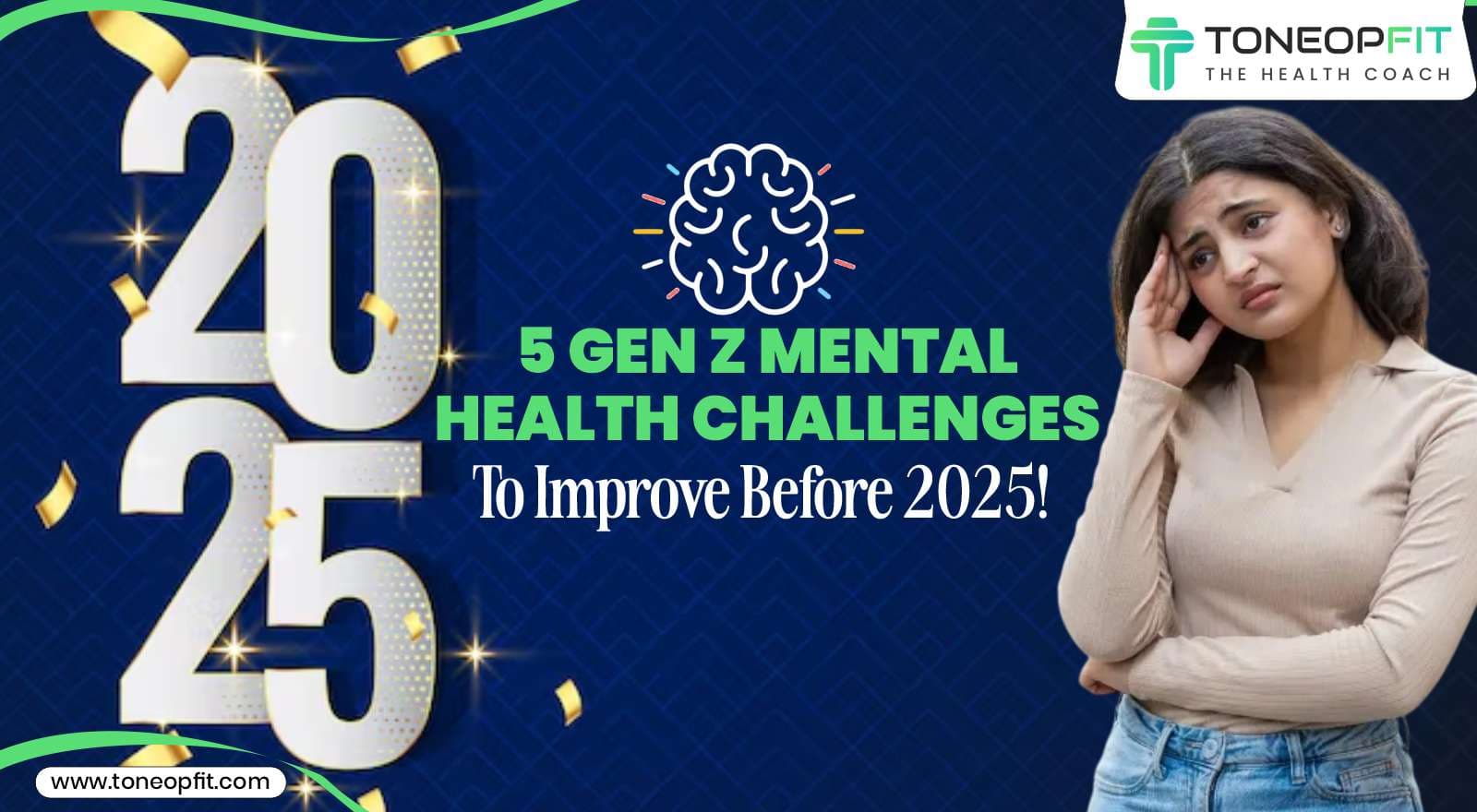As we approach 2025, Gen Z, often called the "iGeneration," faces a unique set of mental health challenges in an increasingly complex and digital world. Are the pressures of social media, academic demands, and an uncertain future taking a toll on your mental well-being?
Do you find it challenging to strike a balance between identity crises and dealing with the growing anxiety around climate change and social issues? These Gen Z mental health challenges to improve before 2025, coupled with isolation, screen addiction, and societal expectations, have left many struggling to prioritise their mental health. However, with the right strategies, these hurdles can be overcome.
From healthier relationships with technology to building resilience through mindfulness, self-care, and community support, there are actionable ways to tackle these issues head-on. This blog explores five mental health challenges Gen Z must address before 2025 and provides practical tips to regain control, find balance, and cultivate a more positive outlook. So, let’s get started!
Table Of Contents
1. 5 Gen Z Mental Health Challenges To Overcome Before 2025
2. 7 Tips To Overcome Mental Health Challenges Before 2025
3. Expert’s Advice
4. The Final Say
5. FAQs
6. References
5 Gen Z Mental Health Challenges To Overcome Before 2025

Gen Z, popularly referred to as the "iGeneration," is facing a unique set of mental health challenges exacerbated by the digital age. A significant global population, one in five individuals, experiences mental health symptoms. Mental health disorders often emerge early in life, with half beginning before the age of 14 and three-quarters developing before the age of 24. Worldwide, 970 million people are affected by mental illness, and one in four will experience a mental condition at some point in their lives.
Consider these Gen Z mental health challenges to improve before 2025:
1. Social Media And Screen Addiction
The digital age has opened unparalleled connectivity for Gen Z; however, it has also brought along an unprecedented increase in screen addiction and mental health challenges with unfavourable comparisons through social media apps, cyberbullying, and unrealistic portrayals of life, which only escalate anxiety and depression.
Addressing this requires promoting digital detox practices and encouraging people to take regular breaks from their screens to reconnect with reality. Mindful social media use is equally vital, teaching Gen Z to engage consciously plus avoid harmful online behaviours.
2. Academic Pressure And Perfectionism
Gen Z faces intense academic pressure, often striving for perfection in an increasingly competitive world. This pressure causes chronic stress, burnout, and feelings of inadequacy. Fulfilling a culture that values progress and effort over unattainable perfection is a must to reduce this. Introducing stress management techniques like yoga, the best exercises for brain health, mindfulness, and journaling can help students cope effectively.
Supportive learning areas prioritising inclusivity and mental health awareness can significantly reduce the burden, enabling students to develop without compromising their wellness.
3. Climate Anxiety And Eco-Anxiety
The looming threat of climate change has given rise to climate and eco-anxiety among Gen Z, who feel an immense burden to secure the planet’s future. This pervasive fear can impact their mental health, leading to feelings of helplessness and despair.
Addressing this requires mindfulness exercises to crush anxiety, and age-appropriate environmental education gives accurate information and dispels myths, empowering them with the knowledge to take action. Encouraging participation in ecological initiatives allows young people to channel their doubts into productive efforts.
4. Isolation And Loneliness
Many Gen Z feels lonely and isolated, even though this is the most digitally connected generation. Lack of face-to-face interactions, paired with over-reliance on digital communication, are some of the causes behind this growing concern.
Social engagement, group activities, and meaningful relationships have strengthened social connections and decreased loneliness. Mental health awareness programs, along with safe space opportunities for open conversation, will decrease stigma, making it easier for young people to ask for help.
Try ToneOp Care's Anti-Aging Vegan Solution, which is a daily supplement designed to combat the signs of ageing and promote overall well-being. Enriched with essential omega-3, 6, and 9 fatty acids, this vegan formula supports eye health, regulates blood pressure, rejuvenates skin, aids in weight management, and strengthens bone density.
5. Identity Crisis And Self-Doubt
The quest for self-identity is a significant challenge for Gen Z, often compounded by societal pressures and the overwhelming options of the modern world. Many experience self-doubt as they navigate questions about their purpose, career paths, and future.
Teaching self-compassion techniques can help them develop a positive self-image and reduce harsh self-criticism. Providing career counselling and guidance tailored to their interests and skills can give them a clearer sense of direction.
Also Read: 7 Best Yoga For Stress Management And Its Instant Benefits!
7 Tips To Overcome Mental Health Challenges Before 2025
Try these tips to overcome mental health challenges before 2025:
1. Connect with Others
Relationships, after all, are one very important factor in emotional wellness. Bond with your families by eating dinner together, having family trips, or just video calls with family who live miles away. In community activities, you may build connections, and willing volunteers have opportunities to extend your reach of connections.
While technology makes communication easier, prioritise in-person interactions whenever possible, as they offer deeper emotional benefits that virtual connections cannot replace.
2. Stay Physically Active
Physical activity is vital for holistic health and helps in enhancing mental well-being. Engaging in regular mental health exercises increases endorphins, builds confidence, and helps stabilise your mood. Include enjoyable activities such as walking, dancing, or cycling.
If the gym is not your thing, consider homework out or even outdoor exercise. Consistency is far better than intensity; the shorter the time, the better for mental wellness as long as it is every day.
3. Learn Something New
New skills will stretch your mind, increase your self-esteem, and create a sense of fulfilment within you. You may want to learn a new language, try a different recipe, or perhaps learn something creative like painting or writing.
Learning enhances your life, and you can even consider attending classes for personal or professional growth; however, informal options, like DIY projects or online tutorials, work just as well. Lifelong learning sharpens the mind and inspires rich interactions.
4. Give Back In Form Of Gratitude
Helping others has a deep impact on the emotional well-being of a person as it gives them purpose and fulfilment. Acts of kindness include volunteering for a community project, helping a colleague, or thanking someone who had your back. These acts ripple goodness into your life as well as the lives of other people.
By giving back, you opt for healthy habits for good health that strengthen your community while boosting your mental health and nurturing meaningful relationships.
5. Practice Mindfulness
Mindfulness is a simple and effective way to manage stress, enhance focus, and live in the present. You clarify your thoughts, feelings, and surroundings and reduce anxiety. Simple practices like mindful eating, walking, or deep breathing can easily fit into your daily life.
Meditation apps, guided sessions, or even creating quiet spaces can make mindfulness a regular habit. Small, consistent efforts to stay present can help you handle challenges with greater resilience and ease.
For personalised workout routines that can complement your caffeine metabolism, consider ToneOp Fit's Home Workout Plan. Choose from bodyweight exercises, HIIT workouts for a quick sweat session, or targeted strength training to build muscle and accelerate your metabolism.
6. Eat A Brain-Healthy Diet
Nutrition significantly influences mental health; certain healthier food swaps can enhance mood and cognitive function. Incorporate brain-boosting options like fatty fish rich in omega-3s, nuts, avocados, dark leafy greens, and fruits into your meals.
Dark chocolate, when consumed in moderation, also offers mental health benefits. For tailored advice, consider consulting a registered dietitian to create a diet plan supporting your brain and holistic wellness.
Try ToneOp Care’s Spirulina Powder. This nutrient-dense superfood can help increase haemoglobin levels, boost your immune system, and significantly boost energy. It’s a vegan, gluten-free option packed with antioxidants and nutrients, making it a popular choice even among students.
7. Don’t Skip Sleep
Sleep is an essential process for rejuvenating both the body and mind. To improve your sleep quality, try the best mental exercises for sleep and reduce exposure to screens like TVs, smartphones, or computers before bedtime, as they disrupt your natural sleep cycle.
Instead, enjoy relaxing activities such as reading or listening to soothing music. Ensuring sufficient, restful sleep helps recharge your mental and physical health, leaving you better prepared to face daily challenges.
Also Read: Overweight Vs Obese: Which Is Worse? Discover Risk Factors, BMI And More!
Expert’s Advice
I recommend taking a proactive approach to mental health. Remember, the goal isn't perfection but steady progress towards greater happiness. Begin committed to this journey and watch as small steps significantly improve your mental health and overall life satisfaction.
Early intervention is important; mental health problems are addressed early to reduce stress and facilitate recovery. Delayed treatment worsens symptoms and complicates the process of recovery. Education about mental health helps in the early identification of problems and timely interventions.
Health Expert
Lavina Chauhan
The Final Say
Ultimately, 2025 offers a chance to translate knowledge into tangible actions. Organisations can overcome problems in workforce strategies by prioritising the issue of mental health within the organisation and leading the industry through healthier, more involved workforces. Prioritising mental health is about growing emotional well-being and improving resilience. It is always easier to build good habits if people have achievable goals and progress.
FAQs
1. What should I do if I'm struggling to maintain my mental health goals?
If you're struggling to maintain your mental health goals, start by being kind to yourself and recognising that setbacks are normal. Break your goals into smaller, manageable steps, and celebrate your progress along the way. Consider seeking support from friends, family, or a mental health professional to help keep you accountable and motivated.
2. Can mental health goals improve my overall well-being?
Absolutely, because setting and obtaining goals for your mental health works amazingly to improve wellness in most people. Working through goals builds resilience, melts down stress, and even enables more significant accomplishment when obtained. This positive aspect ensures fulfilment in life.
References
- https://faithbehavioralhealth.com/mental-health-goals/
- https://www.bcmhsus.ca/about-us/news-features/10-tips-boost-your-mental-healt
- https://www.news-medical.net/health/What-are-the-Current-Challenges-in-Mental-Health-Disorder-Diagnosis.aspx
- https://journalofcomprehensivehealth.co.in/mental-health-current-issues-and-challenges-in-india/
- https://pmc.ncbi.nlm.nih.gov/articles/PMC5553319/
- https://www.mentalhealthfirstaid.org/2021/06/the-importance-of-early-intervention-for-people-facing-mental-health-challenges/
- https://www.modernhealth.com/post/2024-learnings-for-2025-mental-health-strategy
- https://momentofclarity.com/new-years-resolutions-to-improve-your-mental-health-in-2025/
About ToneOp Fit
ToneOp Fit is a platform dedicated to improving and maintaining good health through a comprehensive range of goal-oriented health plans with up to 3 Coach support. With a range of Weight Management, Medical Condition, Detox Plans, and Face Yoga Plans, the app also provides premium health trackers, recipes and health content. Get customised diet, fitness, naturopathy & yoga plans and transform yourself with ToneOp.










































